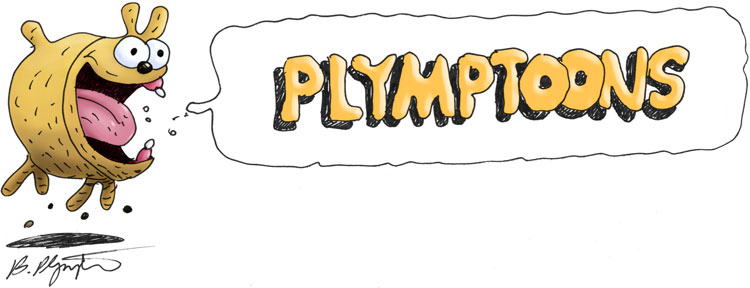 Born in Portland, Oregon to Don and Wilda Plympton, he grew up in a large family of three girls and three boys. For the six children it was often far too wet to play outside. Plympton credits Oregon’s rainy climate for nurturing his drawing skills and imagination. He also was a cub scout and played little league when the weather permitted. In 1964 he graduated from Oregon City High School where he participated in the art club. He went on to Portland State University, where he edited the yearbook and was a member of the film society, creating posters for them. It was here where he picked up his obsession for film – it was for this film society that he first attempted animation, making a yearbook promo that was accidentally shot upside-down, rendering it totally useless.
Born in Portland, Oregon to Don and Wilda Plympton, he grew up in a large family of three girls and three boys. For the six children it was often far too wet to play outside. Plympton credits Oregon’s rainy climate for nurturing his drawing skills and imagination. He also was a cub scout and played little league when the weather permitted. In 1964 he graduated from Oregon City High School where he participated in the art club. He went on to Portland State University, where he edited the yearbook and was a member of the film society, creating posters for them. It was here where he picked up his obsession for film – it was for this film society that he first attempted animation, making a yearbook promo that was accidentally shot upside-down, rendering it totally useless.
To avoid the Vietnam War, Plympton served in the National Guard from 1967 to 1972. In 1968, he moved to New York City and began a year of study at the School of Visual Arts. Making the Big Apple his home, Plympton served 15 years as an illustrator and cartoonist. Between toting his portfolio and catching cheap matinees, he designed the magazines: Cineaste, Filmmakers Newsletter, and Film Society Review. His illustrations have graced the pages of The New York Times, Vogue, House Beautiful, The Village Voice, Screw, and Vanity Fair. His cartoons appeared in such magazines as Viva, Penthouse, Rolling Stone, National Lampoon, and Glamour. In 1975, in The Soho Weekly News, he began “Plympton,” a political cartoon strip. By 1981, it was syndicated in over twenty papers by Universal Press Syndicate.
All his life, Bill Plympton has been fascinated by animation. When he was fourteen, he sent Disney some of his cartoons and offered up his services as animator. They wrote back and told him that while his drawings showed promise, he was too young. It wasn’t until 1983 that he was approached to animate a film. The Android Sister Valeria Wasilewski asked Plympton to direct and animate a film she was producing of Jules Feiffer’s song, “Boomtown.” Connie D’Antuono, another of the film’s producers, “sort of held my hand through the whole process,” Plympton says. “It was a great way to learn to make a film.”
Immediately following the completion of “Boomtown,” he began his own animated film, “Drawing Lesson # 2.” Production of the live action scenes was slow due to inclement weather, so Plympton decided to start on another film. For this one, he contacted Maureen McElheron, an old friend with whom he had performed in a Country Western Band (he played pedal steel guitar), and she agreed to score “Your Face.” Due to budgetary considerations, she also sang. Her voice, eerily decelerated to sound more masculine, combined with a fantastically contorting visage helped garner the film a 1988 Oscar nomination for best animated short.
“Suddenly people began returning my phone calls,” remembers Plympton. He became very hot in the commercial business doing spots for such clients as Trivial Pursuit, Nutrasweet, Taco Bell, AT&T, Nike, Geico, United Airlines and Mercedes-Benz. His work also started appearing with more and more frequency on MTV and in the increasingly popular touring animation festivals. After a string of highly successful short films (“One of Those Days,” “How to Kiss,” “25 Ways to Quit Smoking,” and “Plymptoons”), he began thinking about making a feature film. His shorts were winning prizes like crazy and he wanted a new challenge – and, as he puts it, “I’d wanted to make a full-length movie ever since I was a kid.”
What came to be called THE TUNE was financed entirely by the animator himself. Sections of the feature were released as short films to help generate funds for production. These include “The Wiseman” and “Push Comes to Shove,” the latter of which won the 1991 Prix du Jury at the Cannes Film Festival. With money from his short film prizes and commercial work, he was able to complete THE TUNE and realize a childhood dream. The completed TUNE also made the rounds of the film festivals, garnering the prestigious Houston WorldFest Gold Jury Special Award as well as a Spirit Award nomination for Best Film Score and was distributed nationally by October Films.
After personally drawing and coloring 30,000 cels for THE TUNE, Plympton moved to live-action. J. LYLE, his first live-action feature, is a wacky, surreal comedy about a sleazy lawyer who meets a magical talking dog that changes his life. “Making THE TUNE, I had a lot of ideas I realized wouldn’t work with animation, but would be lots of fun with real people! I took those ideas and made J. LYLE. Besides, my hand needed a rest after drawing THE TUNE.” After a successful festival circuit, J. LYLE was released in theaters around the country. Like THE TUNE, J. LYLE was financed entirely by the animator himself.
Plympton’s second live-action feature, GUNS ON THE CLACKAMAS, a behind-the-scenes look at an imaginary disastrous Western, was shot in Oregon and New York. Plympton says the idea came from the 1937 movie “Saratoga”, in which star Jean Harlow died during the filming and a stand-in was used to finish. “It was supposed to be a drama,” says Plympton, “but it ended up being funny. Every time Harlow was in a scene, a box or something blocked the view.” As with J. LYLE,GUNS ON THE CLACKAMAS got a limited theatrical release.
In 1996, Bill Plympton followed “Mala Noche” writer Walt Curtis around his Portland hometown to record him reading his poetry. This outrageous performance film hit the festival circuit in 1997 to stunned audiences. It is entitled WALT CURTIS, PECKERNECK POET.
In 1998, Bill returned to animation with I MARRIED A STRANGE PERSON. It’s a heartwarming story of a newlywed couple on their wedding night. Grant, the husband, starts experiencing strange, supernatural powers and Kerry, his wife, can’t cope. Whenever Grant thinks of something, it becomes reality, yet he doesn’t know where these magical powers come from. Once again Bill Plympton single-handedly drew and financed an animated feature extravaganza – only this time for adults and the politically incorrect. It was released by Lions Gate Films to good box office numbers and still plays today on cable TV.
Bill’s next animated feature, MUTANT ALIENS, the story of a stranded astronaut returning to Earth after 20 years in space, was completed in January 2001 and premiered at the Sundance Film Festival. It won the Grand Prix in Annecy 2001 and was released in theatres in 2002. It has played all over the world to huge audiences.
Bill’s feature film, HAIR HIGH, is a gothic ’50s high-school comedy about a love-triangle that goes terribly bad, with two young, murdered teens returning to their prom to get revenge. It stars the voice talents of Sarah Silverman, David & Keith Carradine, and Dermot Mulroney, and was co-produced by Martha Plimpton. Plympton charted new territory in animation, this time by broadcasting all of his drawing for the film live on the web at www.hairhigh.com. The film was completed in January 2004, released in over 50 cinemas around the country – and was released on DVD.
Bill’s short film GUARD DOG has been a hit at film festivals and it brought Bill his second Oscar nomination in January 2005. Two equally successful sequels soon followed, “Guide Dog” in 2006 and “Hot Dog” in 2008. Throughout his career, Bill has always made 2 to 3 short films a year that keep bringing in a solid income from sales around the world.
His feature film, IDIOTS AND ANGELS, was completed in 2008 and after a successful run on the film festival circuit, was released in U.S. theaters in 2010. The film features the music of Tom Waits, Pink Martini, Nicole Renaud and Maureen McElheron, and no dialogue. It’s a much more mysterious film than his previous ones, a dark comedy about a man’s battle for his soul. “Because this film has no dialogue,” Plympton says, “I wanted music to play throughout – almost like a long opera – or an extended string of music videos. The look of the film is very Eastern European – something like what Jan Svankmayer might make, or David Lynch if he made animation – very dark and surreal.”
Bill waited a little while before starting his next feature, and used the time to release several successful short films, such as THE COW WHO WANTED TO BE A HAMBURGER, SUMMER BUMMER andDRUNKER THAN A SKUNK. But eventually his plans returned to feature-length animation, and he started work on CHEATIN’, the story of two lovers, Jake and Ella, who encounter jealousy and insecurity after their perfect courtship.
Partially inspired by the works of James M. Cain, and partially inspired by a past relationship, CHEATIN’ is a tale of exaggerated passion and star-crossed lovers, exploring the dual nature of how two people immensely attracted to each other can also want to kill each other at the same time. CHEATIN‘ may also be the first animated feature partially funded on Kickstarter, with loyal Plympton fans kicking in over $100,000 needed to finish it.
Plympton’s movies have won him such a loyal following that the cable channel Shorts HD bought the rights to his entire library and set up a Bill Plympton channel on iTunes, something he hopes will engage a whole new generation of fans. Bill is currently working on finishing HITLER’S FOLLY, a mock-umentary about Adolf Hitler’s love of animation. He’s directing and drawing another film called REVENGEANCE, written by animator Jim Lujan, which is also being partially funded through a Kickstarter campaign.
